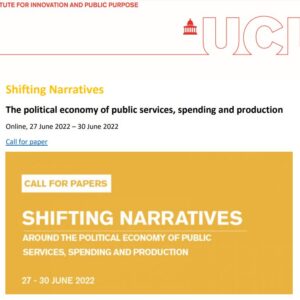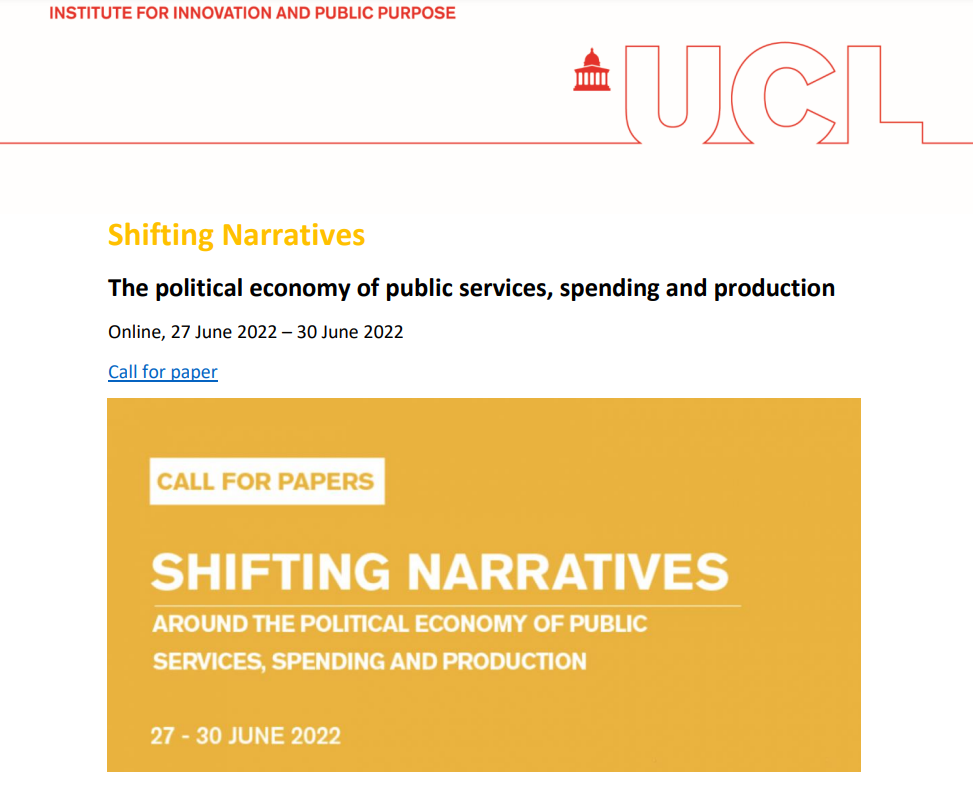
- This project has passed.
Shifting Narratives
YSI participation @IIPP UCL
Start time:
June 27, 2022 - June 30, 2022
EDT
Location:
Online and UCL Institute for Innovation and Public Purpose, Greater London, England, WC1E 6BT
Type:
Workshop

Local Partners
Description
Shifting Narratives: The political economy of public services, spending and production
Online conference with an in-person YSI workshop in University College London
27 June 2022 – 30 June 2022
Event Information:
Open to:
All but registration is required.
Organisers:
UCL Institute for Innovation and Public Purpose (UCL-IIPP)
University of Greenwich’s Public Services International Research Unit (UoG-PSIRU)
In partnership with:
- Azim Premji University, India
- CONICET, Argentina
- Public Services International (PSI)
- Transnational Institute (TNI)
- University of Ghana, Institute of African Studies
- Young Scholars Initiative, Institute for New Economic Thinking (YSI-INET)
Call for papers
This is advance notice of, and call for contribution proposals for, a four-day online conference on shifting narratives around public services, spending and production (PSSP). It will examine, globally, the contested landscape of PSSP, and the shifting balance between mainstream narratives hostile to PSSP, such as austerity, and the political, social, economic, and other factors – such as COVID-19 and climate change – bringing positive narratives and theories for a greater role for PSSP.
It will provide not only an academic conference for leading research on these issues, but also a forum for sharing information by bringing together experience, insights and tools from academics and young scholars with those involved in these narrative shifts – social movement activists, trade unions, media and NGOs.
The economic and political role of public services, public spending and public production of goods and services has been a central issue for economic and social policy at national and international level for many decades. There are thus continuing disputes over the scope of public service systems, and the scale of government spending on these services. The theories and analyses used by economists and political scientists form a significant set of narratives in this contest. Some critique the fiscal burden of taxation on commercial activity, and the disruption of labour markets by public employment, while favouring the use of public spending and services as opportunities for private finance through PPPs or long-term outsourced contracts. Others frame analyses around the key role of PSSP in driving innovation and delivering new public missions, its economic role in providing physical and service infrastructure, the role of public sector capacity in direct provision of goods and services and enabling public policy development shielded from corruption, and its historical role in delivering socio-economic, racial and gender equality, and enabling democratic control, transparency and accountability.
This conference grows out of a report on ‘Narrative change and Public Services, Spending and Provision’ carried out by a team led by PSIRU. Social movements and unions have recently summarised the social and economic case for PSSP in a ‘global manifesto’: 'The future is public' , and other reports on issues related to public services are published by the global partners in this conference – Public Services International (PSI) and Transnational Institute (TNI). This conference is supported in part through a grant from the Open Society Foundations (OSF).
The objectives of the conference are to:
- bring together academics, unions and social movements in a 2-way sharing of research and information on issues, trends and campaigns around public services, globally
- to encourage critical academic research on PSSP issues and narratives of concern to SMs/unions
- to encourage collaboration between academics/young scholars and social movements
and unions
Conference Structure
-
Day 1 will be a plenary session with a number of invited presentations on the political economy and narratives of PSSP, by leading academics and speakers from unions and social movements.
-
Day 2 will have thematic workshops, including one on narratives of public spending and workshops on a range of issues eg public finance, economic planning, trade and public services, participatory budgeting. Each workshop will last 1.5 hours, with 1 hr for papers and contributions from academics, young scholars, unions and social movements, with 30 minutes of discussion.
-
Day 3 – there will be parallel workshops on public service trends, narratives and issues in global regions: Africa, Americas, Asia, Europe. These workshops will follow a similar format of 1.5 hours, including papers and contributions from academics, young scholars, trade unions and social movements, followed by discussions.
-
Day 4 will be a final forward-looking plenary session with an invited panel of speakers including academics, union and SM speakers, discussing future academic agendas and the prospects and strategies in relation to PSSP, and the potential for collaboration. We also hope to organise an in-person meeting for young scholars, and young trade unionists/activists close to the dates of the conference in London.
Young Scholar's Participation in the conference
Young scholars’ participation – co-ordinated with the Young Scholars Initiative, Institute for New Economic Thinking
Young scholars are strongly encouraged to participate in the conference and workshops in a
number of ways:
• by submitting proposals in response to the call for papers for the workshops
• volunteering to be ‘initial respondents’ in workshops, asking a question or comment to help start discussion (optional)
• volunteering as rapporteurs to write summary 500-word reports of the workshops (optional)
• volunteering to help academics, unions and social movements organise regional workshops (optional)
Young scholars are also encouraged to express interest in participating in the proposed YSI session in London in late June (close to the conference dates) with limited travel and accommodation support.
Any enquiries related to application are to be sent to Dr. Surbhi Kesar ([email protected])
The timeline for submission is:
• Deadline for submission of abstract (approx. 250 words) is 25 April 2022
• Acceptance letters will be sent out on 02 May 2022
• Accepted proposals will be expected to submit a full draft of the paper by 30 May 2022
Submission link: https://forms.gle/QN6drGmzxU9UBJJh6
